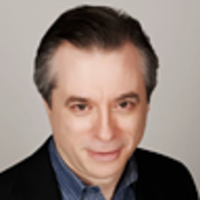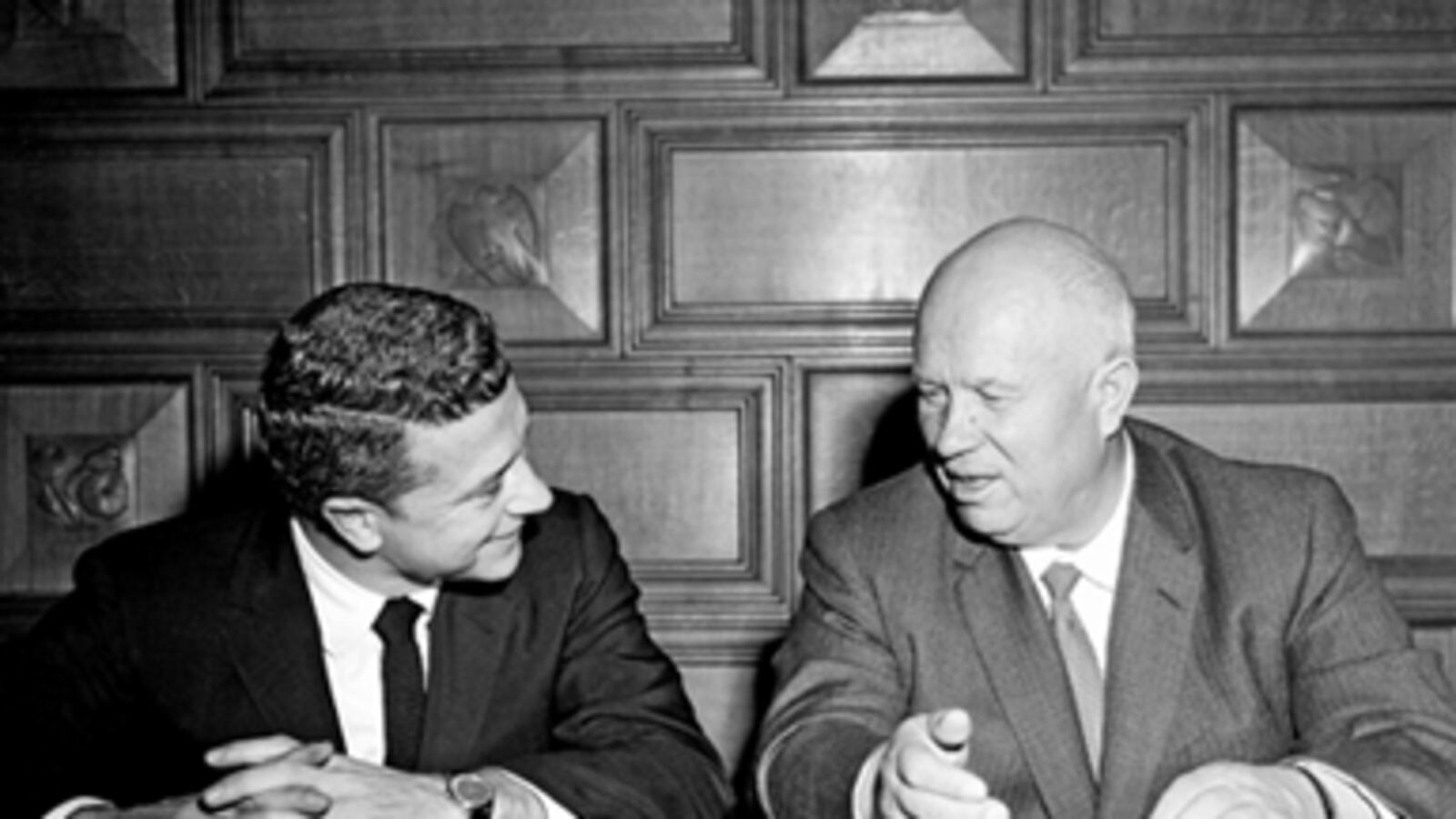In the days after David Susskind confirmed Soviet premier Nikita Khrushchev was to be his guest on Open End on October 9, 1960, members of the press and the public lashed out at him. Hungarian freedom fighters shouted insults as they picketed in front of Talent Associates headquarters at 444 Madison Avenue. The office was deluged with telephone calls, telegrams, and hate mail from people who called Susskind a “dirty red” and a “kike.” Susskind claimed that threats were made against his children.

“Disgusting!” was the headline on the New York Daily Mirror editorial denouncing the interview. “We draw the veil,” it said. “When Susskind comes on, we shall turn the television off.”
When a newspaper clipping about the upcoming program landed on the desk of FBI director J. Edgar Hoover, he scrawled under it, “What do our files show on Susskind?”
On the evening of the program, the tension became palpable in Susskind’s home on Fifth Avenue. WNTA executives Ely Landau and Ted Cott had shown up to go over questions—something they had never done for any previous Open End.
“I am old enough to be your father, and, young man, it is unworthy to speak to me like this,” Khrushchev scolded.
Susskind had written more than a hundred questions for Khrushchev. While Ambassador Mikhail Menshikov indicated that Khrushchev was usually in bed by 10:45 p.m., Susskind was prepared if the premier felt the need to extend the dialogue into the early-morning hours. Just before Susskind was out the door to head over to the United Nations for the program, he got some advice from his son, Andrew, then 6 years old. “Dad, whatever you do, don’t let Nikita Khrushchev declare war on your show,” he said.
Susskind did not have a credential to park at the United Nations. He left his car a block away and had to walk over to the heavily guarded U.N. headquarters. Across the street on the southwest corner of 47th Street and First Avenue, about a hundred sign-waving anti-Soviet demonstrators were gathered along the sidewalk. Their messages read, “We got plenty of murderers on TV, we don’t need Khrushchev,” “Dial K for Murderer,” and one that could not have made Susskind's business partner Al Levy and financial advisor Alan Hirschfield very happy: “Mr. Susskind Deals with Khrushchev, Can Madison Avenue Afford to Deal with Susskind?”
Susskind, Khrushchev, and Soviet interpreter Viktor Sukhodrev were seated side-by-side at a long table in Conference Room 3 at the United Nations, which served as a TV studio for the broadcast. Through Sukhodrev’s interpreting, Susskind chatted with the premier in the moments before the live feed went out at 9:00 p.m. Susskind asked Khrushchev if he slept calmly while knowing that the destiny of mankind depended largely on him.
“I always sleep calmly,” the premier replied. He then said he wanted all the questions and replies to be keyed toward an improvement in the relationship between our countries.
“We have a good word, ‘yes,’ ” said Susskind. “That’s the English for da.” “I also would like to hear da from you,” said Khrushchev. Amused by the response and Khrushchev’s jovial manner, Susskind observed that he found it hard to fathom how a man who has “such a sense of humor can inspire a fear of war.” If the two could remain in the conference room where they were seated instead of the hall where the General Assembly had been listening to Khrushchev in recent weeks, “the world would be in complete safety.”

“You are mistaken,” Khrushchev told him.
Susskind opened the program with a short, earnest speech about his intentions for doing the interview (“In a free republic, it is our job, I think, never to trammel inquiry . . .”). With corked bottles of Borjami mineral water on the left and the right of him, Khrushchev impassively looked straight ahead as he awaited the questions in Russian from Sukhodrev, who sat to his left. The premier appeared to be awash in the bright television light that reflected off the shiny crown of his round, bald head (he refused to wear makeup). It conjured up the image of a man’s face in the moon.
Once the interview began, Susskind’s tone immediately took a confrontational tack. He became an advocate for America rather than a civilized interlocutor. He was no match for the crafty Khrushchev, who barreled along with his standard bromides about how if people truly understood communism and socialism, they would embrace them. “They were like boxers in different weight classes,” said Sukhodrev. “Basically, Khrushchev was his usual blustering long-winded self and there was no way that David could stop him.”
The consecutive interpreting didn’t help. Both Susskind’s questions and Khrushchev’s answers went through Sukhodrev, causing a single exchange to go on for nearly 10 minutes or longer. Khrushchev suggested bringing mattresses into the conference room in case the interview went late into the night.
Susskind grew frustrated and asked again if Khrushchev’s answers could be interpreted simultaneously. Khrushchev used the request to mock the United States. “I don’t know how it can be done,” he said. “It seems that American technology is not up to that. You come along and we’ll do it immediately.” Khrushchev leaned into Susskind as he gave his answers in Russian, repeatedly jabbing and grabbing his arm while making points.
Susskind’s dissatisfaction over the proceedings likely led to a verbal swipe he made at Khrushchev’s pronouncement that communism is “the most noble teaching in the world.” It became his signature line of the night. “You’re baying at the moon,” Susskind said to the man he had deemed responsible for mankind’s destiny just moments earlier.
Khrushchev became visibly agitated. He believed Susskind had crossed the line from robust debate, which the premier appeared to be enjoying, to disrespecting him. “I am old enough to be your father, and, young man, it is unworthy to speak to me like this,” Khrushchev scolded.
Susskind was alarmed by the response and apologized. Looking back, Sukhodrev believed his interpretation of the word “baying” as “barking” exacerbated the exchange. “There was no absolute word in the Russian idiomatic language,” he said. “In hindsight I didn’t do too well. I should have softened it. Khrushchev was offended by that likening of him to a dog barking. I should have said maybe you’re trying to break into an open door. That might have been a mistake on my part. What else could I say?”
The contretemps escalated during a commercial break when Khrushchev was handed a note by one of his advisers. It said the Open End broadcast was carrying public service announcements for Radio Free Europe, the CIA-funded broadcast service that beamed pro-democracy messages and programming into Eastern Europe. RFE spots typically used blunt imagery of hands grabbing onto barbed wire or broadcasters from captive nations being bound and gagged. The one that aired on Open End showed a Communist soldier smashing a radio set with an axe.
Edythe Landau, the wife of WNTA board chairman Ely Landau, said her husband was not aware of the decision to run RFE spots on Open End until he saw them on the air. “I remember sitting in the den watching this,” she recalled. “I thought he was going to have a heart attack. He called the station and screamed and raved and ranted.”
But no one was angrier than Khrushchev, who immediately denounced the RFE announcements as a dirty trick while he and Susskind were off camera. “You are afraid of communism, afraid of the truth!” Khrushchev said after receiving the note. “Well, all right, let them screen it. We are not afraid. This will only make us stronger. . . . Let them do it.”
In the days that followed the program, no one at WNTA took responsibility for running the RFE spots. It was common for stations to fill unsold commercial time with the announcements in those years, and it was certainly conceivable that their placement on Open End was coincidental. But in fact, it wasn’t. Ted Cott later acknowledged that he signed off on the idea, fully aware that running the announcements adjacent to Khrushchev’s rants was a political statement. “The intent of putting this on was to dramatize the fact that we in the United States were giving Mr. Khrushchev unlimited time to say whatever he felt, on American television, whereas they were jamming all our broadcasts in the Soviet Union—and this was the editorial point we were trying to make,” he told an oral historian two months later.
When the program resumed, Khrushchev eventually calmed down and answered a few more questions. But with no prompting from Susskind, the premier stood up from his chair and appeared ready to leave. Susskind stood to remove the microphone cord from around Khrushchev’s neck. As he reached for it, the feared Soviet leader gave Susskind a playful bear hug. (The embrace caused Susskind to stiffen up “like an unwilling virgin,” he later said.) But there was also a bit of panic on Susskind’s face as he realized the interview was ending without generating any real news. He kept the discussion going, pressing the premier to categorically state he would never start a war.
As Khrushchev went on about how the Russians wanted friendship and peace with the United States, he noticed he was no longer wearing his microphone and wondered out loud if viewers were hearing his remarks. “How tricky you Americans are,” he said. Susskind assured Khrushchev he could be heard as they continued to talk for nearly another half-hour more. Sukhodrev, eager for the night to end, removed his microphone and nervously rubbed his fingers over the top of it. It made a scrapping sound that viewers heard at home. “I felt this could go on forever,” he recalled.
Critics were not kind to Susskind’s effort. Time magazine called it a sideshow. The New York Times TV critic, Jack Gould, described it as an “international turkey.” But they missed the historical significance of the event. Joseph Newman, who had long covered the Soviet Union for the Herald Tribune, rightfully noted that the evening was a modern milestone in news coverage. During the panel discussion that WNTA aired after the interview, Newman recalled the pre-television days of covering Stalin. Even though the Moscow bureau where he worked was blocks away from the Kremlin, no one could be sure who was making policy, what the policy was, or whether Stalin was even alive. Khrushchev’s appearance on live American television was a major advance that forever changed how viewers saw the world. “We’ve had the benefit of a man coming out of that cave in the Kremlin and standing right there in front of you,” he said. “If this is the enemy, how valuable it is to know who the enemy is and how he’s thinking, how he evades and exactly what he supposes to do.” Open End also demonstrated that television would not just settle for covering the news. It was going to package it too. The Khrushchev interview aired within the same month that American voters were swayed by John F. Kennedy’s performance over Richard Nixon in the first televised presidential debates. Nixon, like Khrushchev, refused to wear makeup before going in front of the cameras. In a democracy, that decision proved to be costly.
Stephen Battaglio is the business editor for TV Guide. His coverage of the television industry has appeared in The New York Times, Fortune, the New York Daily News, The Hollywood Reporter and Inside.com. He has appeared as a media commentator on numerous TV news programs including CBS Sunday Morning, NBC's Today and MSNBC's Countdown with Keith Olbermann . David Susskind: A Televised Life is his first book.






